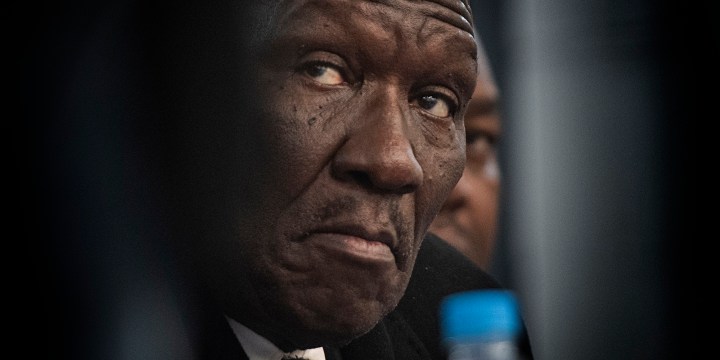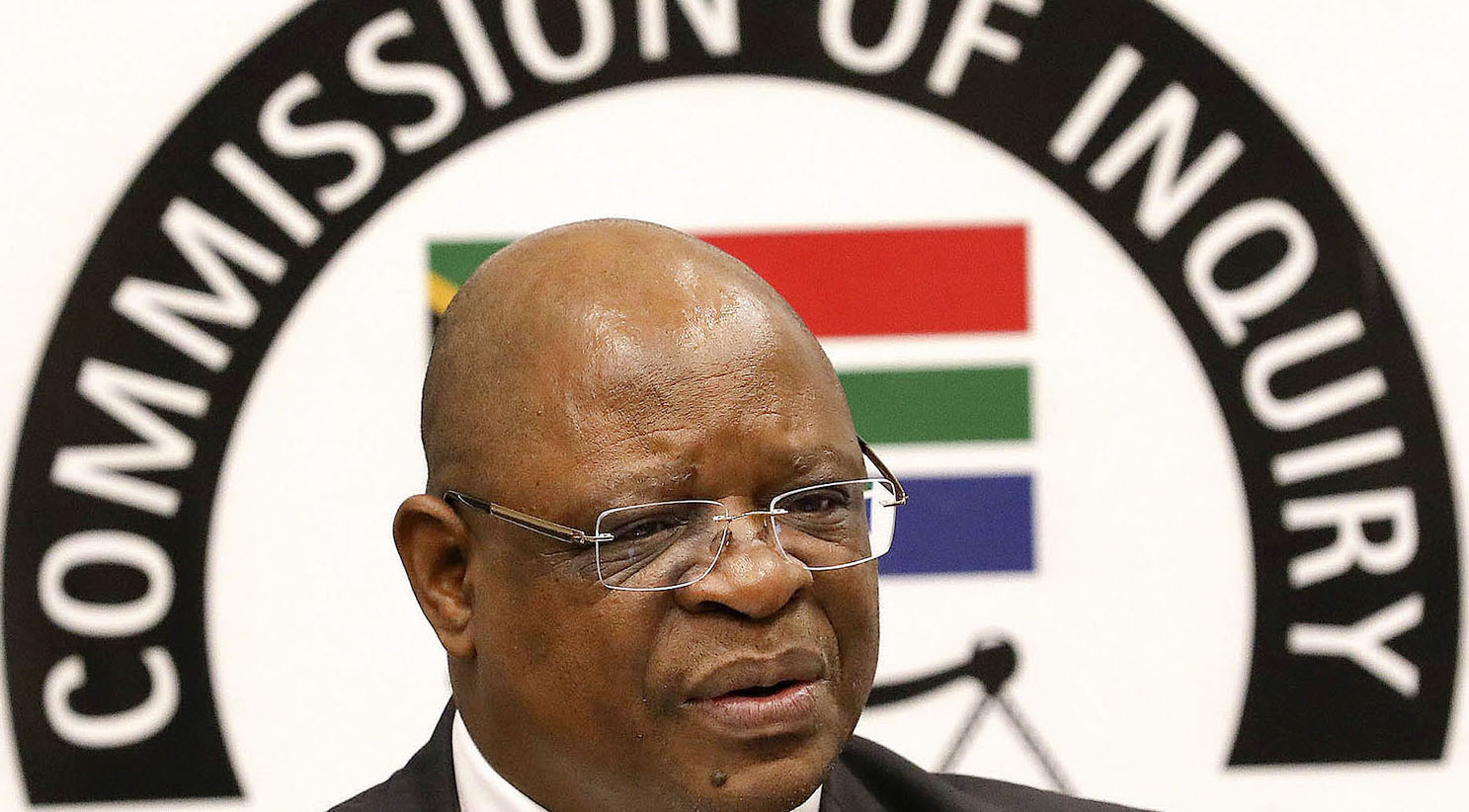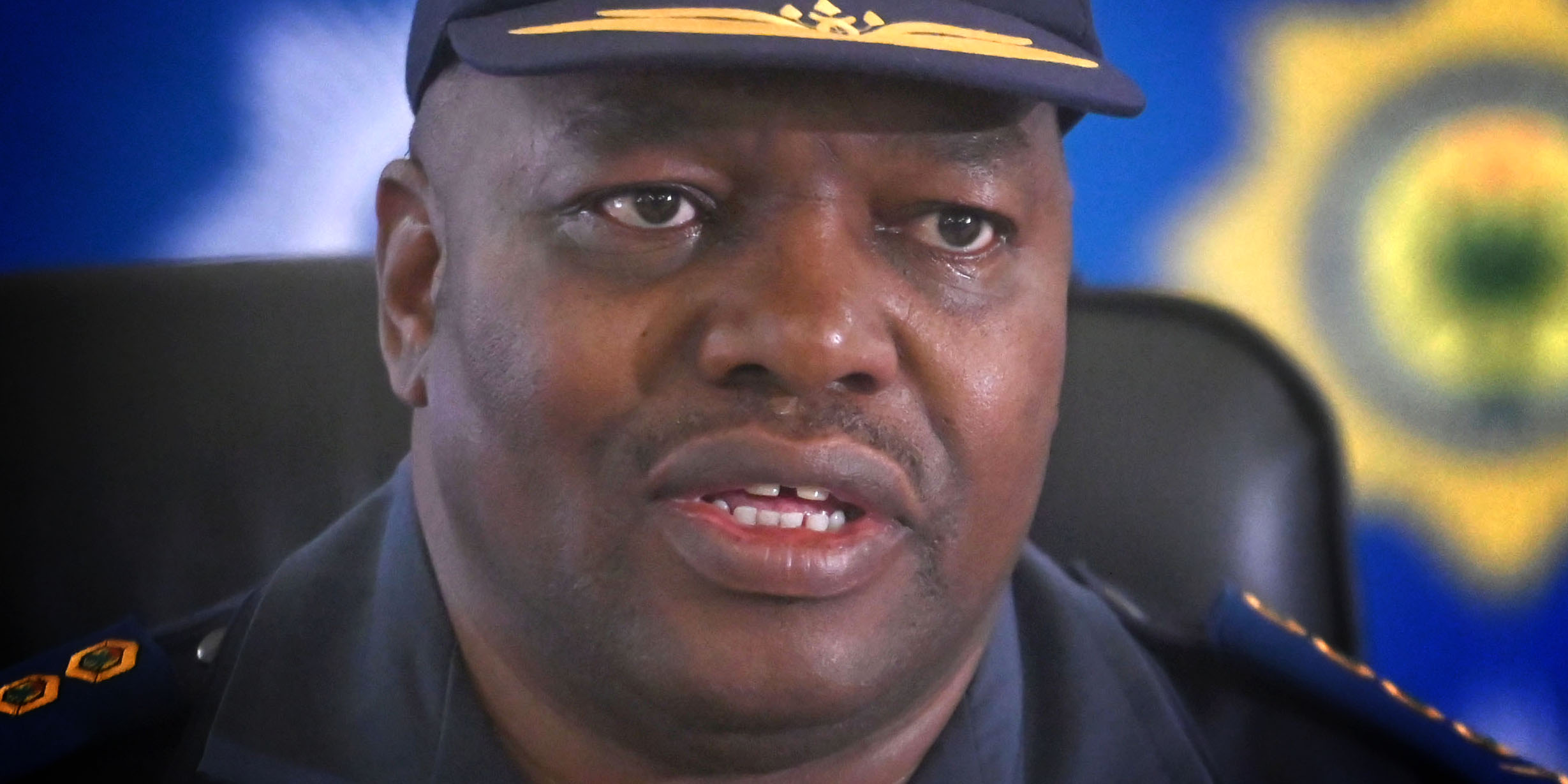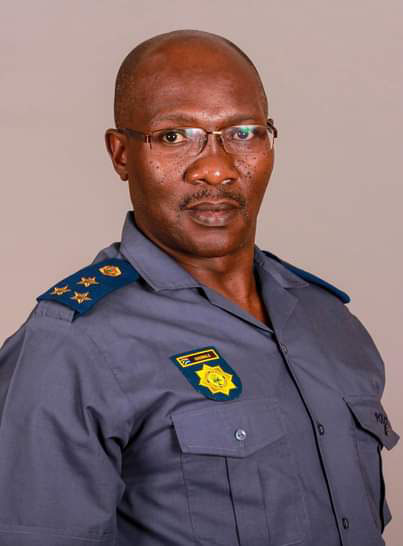SAPS IN CRISIS OP-ED
The broken state of policing is the biggest threat to South Africans

The biggest contributing factor to our out-of-control crime rate is atrocious policing, mismanaged from the national commissioner down to unit and station level, and riddled with nepotism and corruption. Like the proverbial fish, the rot starts at the ministerial top level.
Chief Justice Raymond Zondo, in his comprehensive reports on State Capture, has identified the lack of proper parliamentary oversight as a key factor in allowing gross corruption to flourish with impunity. He has warned that it will continue unless Parliament does what it is constitutionally mandated to do, and holds the executive to account.
Parliamentarians, it seems, have no ears to listen and treat Zondo’s warning with the urgency it demands.

Chief Justice Raymond Zondo. (Photo: Gallo Images / Sowetan / Veli Nhlapo)
While many of the commission’s findings relate to the looting and mismanagement of state-owned enterprises, it is those dealing with the intelligence services, including policing, which have the most serious implications for our country’s security.
The commission’s findings and recommendations reinforce those of other government-initiated reports — the post-Marikana Panel of Experts Report on Policing and Crowd Management (2018) and the High-Level Review Panel Report on the State Security Agency (2018), which stress the urgency of taking remedial action, including legislative.
That no action had been taken three years later is obvious from the Report of the Expert Panel into the July 2021 Civil Unrest, which the panel termed an onslaught on the authority of the state.
The governmental context in which these reports’ findings were made was one in which, for the past 13 years, constitutionally enshrined principles of transparency and accountability have been abandoned, the powers of state security, including in decisions about appointments have increased, and a culture of secrecy prevails.
Legislative changes include the removal of civilian oversight of intelligence services. During these years, ministers became accustomed to acting unconstitutionally by engaging personally in, and micro-managing, operational matters. Instead of functioning as the type of bureaucracies demanded of democracies, the politicised departments became private ministerial fiefdoms — a practice which continues.
Bheki Cele leads the pack
The current leader of the pack is Police Minister Bheki Cele, whose breaches of his oath of office are manifold and well-documented. It is obvious that despite his own shameful record as national commissioner, he is the de facto head of SAPS operations, including in making appointments.
The removal of former national commissioner Khehla Sitole allowed the minister to appoint a more pliable commissioner in the person of General Fannie Masemola, with whom he enjoys a long-standing relationship.

National Police Commissioner Fannie Masemola. (Photo: Gallo Images / Beeld / Deaan Vivier)
Masemola was a deputy provincial commissioner in KZN when Cele was an ANC MEC, and then moved on to become Cele’s deputy when the current minister was national commissioner. Much of the current SAPS corruption, including politicised, nepotistic appointments and promotions, stems from those troubled days.
Anyone wondering why KZN is the main supplier of hitmen need look no further than the years during which Cele was MEC and Masemola was the deputy provincial commissioner. Paramilitary training was taking place in rural areas, especially in the northern parts of the province. Documentation of this is on record.
For example, in 2008, when the then Superintendent Mmamonnye Ngobeni was station commissioner at Ulundi, recruits were being trained at the nearby Mlaba camp by convicted former KwaZulu police hitman Romeo Mbambo, who received amnesty from the TRC for some of his political killings.
The recruits were lined up in camouflage uniforms (illegal under Private Security Industry Regulatory Authority legislation), and a photograph taken by a journalist at the time shows a police vehicle in the background. Ngobeni, who was then promoted by Cele to be provincial commissioner in KZN, was well aware of this, including the fact that youngsters who had been lured there under false pretences were being held against their will. No follow-up action, including prosecutions, happened.
Mbambo (reportedly now deceased) had the economic sense to change political sides and was known to be close to some in the KZN ANC leadership, including Cele, and thrived on his business relationships with them.
The head of Crime Intelligence

General Dumisani Khumalo.
(Photo: SAPS Facebook)
It is Cele who decides on senior appointments. The latest is that of General Dumisani Khumalo as Crime Intelligence head. From what is known about him, Khumalo was a KwaZulu homeland policeman, so he is well-versed in taking political orders unquestioningly. He is reputed to have done guarding duties for the late King Zwelithini, and he would have been integrated, after 1994, into what is now SAPS Operational Response Services (ORS).
According to the late Phillip Mhlongo, an EFF parliamentarian on the pre-2019 Police Portfolio Committee, he (Mhlongo) had to contact the chair of the portfolio committee and arrange an urgent meeting because there was a very serious conflict in the national ORS, linked to the conduct of Khumalo, and lives were at risk. Some sort of intervention to calm the situation took place, and Khumalo — then a brigadier — was eventually moved elsewhere.
Soon afterwards, despite his lack of detective training, Khumalo surfaced as a general, and became head of the grossly irregular and opaque Ministerial Task Team on political killings in KZN, reporting directly to Cele (a very convenient arrangement, since Cele’s own colleagues are potential suspects in political killings).
The irregularity of this arrangement was drawn to the attention of the Police Portfolio Committee in July 2021 and the chairperson claimed it “was news” to her. She agreed that Cele should not be involved in operational matters. However, this involvement has continued, unabated.
The illegal actions of this Ministerial Task Team were again drawn to the Portfolio Committee’s attention following their malicious detention of Thabiso Zulu on 10 October 2021, in the process of which they forced him to hand over his two cellphones, illegally, without a court order. When the phones were returned to him, one was damaged beyond repair. No feedback was received from the committee about whether they had done the requested follow-up to hold Cele to account.
Visit Daily Maverick’s home page for more news, analysis and investigations
Khumalo, with no known training or work experience in intelligence, has now been appointed to head Crime Intelligence nationally. This flies in the face of recommendations of the reports cited.
In Volume 6 of the State Capture reports, Zondo stipulates: “The recruitment criteria must be clear and be strictly adhered to, and certainly there should be no Executive Involvement, let alone bringing in people on familial or other non-professional consideration”. (Italics added.) Yet this is exactly what the minister has done, showing his contempt for the Chief Justice of South Africa.
Adding insult to injury is a media statement by Masemola praising Khumalo’s detective work in securing six life sentences for hitman Fisokuhle Ntuli (accused number 5 in the Senzo Meyiwa trial), which is completely untrue. This conviction was the result of excellent detective work by Hawks Warrant Officer Makhuba and had nothing whatsoever to do with Khumalo. The fabrication of Khumalo’s CV is not surprising, given that Masemola has already perjured himself to Parliament, with his false, defamatory information about prize-winning whistleblower and police rights defender Patricia Mashale.
Nor, four years after the High-Level Report on State Security, has Parliament passed legislation to restructure this crucial agency and restore civilian oversight of the body. Nor has it done anything about providing the Office of the Inspector-General of Intelligence with financial independence from the agency.
Six years after the Constitutional Court ordered that the Independent Police Investigative Directorate (Ipid) be given independence from the ministry, a very shoddy draft bill which does not remove the control of the minister was published for comment before the year-end shutdown.
The oversight powers of Parliament in holding the executive of the country to account are clearly spelled out in Section 55 of the Constitution, but from the “business as usual” conduct of ministers, they are nowhere near being properly exercised. The failure of Parliament to comply with this section of the Constitution poses a threat to the stability of South Africa.
Parallels with apartheid police state
As a social scientist who has been monitoring and researching violence and policing since the 1980s, and situating it in the broader political context in which it has been happening, I see parallels between the situation we are currently in and the apartheid police state.
Instead of developing the professional, apolitical bureaucracies demanded of our constitutional democracy, the functioning of the SAPS and intelligence services has become an extension of political control by the state. The incompetent, nepotistic corrupt SAPS, like its apartheid counterpart, is all-powerful under the command of Cele, who appears to be untouchable.
As during apartheid, hundreds die at the hands of the police each year (more than 200 in police custody alone in 2021/22) and the police abuse and torture with impunity (some wearing balaclavas). It is the job of the SAPS and their minister to prevent crime but, instead of protecting rights defenders Thabiso Zulu and Patricia Mashale they persecute them, and members are implicated in attempts on the lives of both of them.
Like the apartheid police, they now want to increase their already untrammelled powers with poorly worded “anti-terrorism” legislation. The terrorism that stalks our country is that of abnormally high levels of violent crime. Among the most vulnerable are ordinary rural folk in KZN where well-armed killers steal into their dark areas at night and kill them and burn their homes with impunity, courtesy of local and provincial police.
The biggest contributing factor to our out-of-control crime rate, including the proliferation of gun crime, is atrocious policing, mismanaged from the national commissioner down to unit and station level, and riddled with nepotism and corruption. Like the proverbial fish, the rot starts at the ministerial top level.
Should the President retain Cele in his current Cabinet portfolio, no one will believe him when he reiterates his commitment to stamping out corruption — for the most dangerous corruption in South Africa, threatening the lives of all, starts with Cele’s control of the police.
Ultimately, the buck stops with Parliament, and every voter should be putting pressure on their elected parliamentarians to use the powers they have properly. Our Chief Justice makes a number of important recommendations about how its oversight can improve, some of which are specific to how they should be dealing with ministers. He also, correctly, identifies the need for a far better research capacity (sorely lacking in most arms of government).
Unless Parliament, from early 2023, immediately sets about enacting the oversight urged by Zondo and holding the executive (including the President, for his ministerial appointments, accountable), and ensures that recommendations in reports on policing and state security are implemented urgently, it too will shoulder the blame for any further events such as those of July 2021. That the current state of policing is the biggest threat to the security of South Africans cannot be over-emphasised. DM


















 Become an Insider
Become an Insider
You used to join the police to SERVE the citizens of SA,now it seems they join to get rich .
This is the way!
This is one of the scariest articles ever to appear in the Daily Maverick. Our entire police force, indeed the whole state security apparatus needs a thorough, deep-cleansing, starting at the top, the very top, where the deep rot starts.
Like Eskom, it has taken years to destroy SAPS, and create this monster. And also will take years to fix, if ever. Scary that we have to live in such a society.
Agree 100%
A riveting read. ‘Why, we may ask, is Cele so untouchable?’
That is the million dollar question! He obviously knows where bodies have been buried!
Ramaphosa may have a higher IQ compared to Zuma, but he just as adapt in destroying this country as Zuma was.
It seems as though the ANC government is managing to emulate the old NP in every possible way.
All this will only stop when we, as a society, demand a new governance model. One that does not have politicians, the kind we are seeing now. Ones that see crime pays in politics and become politicians for that reason.
I do wish writers would learn how to abbreviate things correctly. If a series of words is abbreviated by using the first letter of each word, then the abbreviation is an acronym and should be written as all capitals, for example: Independent Police Investigative Directorate should be IPID and pronounced “eye-pid”. If an abbreviation is formed from parts of the abbreviated words not just their initials then the abbreviation is just an abbreviation and must be spelled in both uppercase and lowercase letters as defined by the abbreviated words, for example: Electricity Supply Commission should become ESCom. I am sick to death of non native English speakers mauling the English language when they insist on writing in English.
That is what you choose to focus on in this brave and terrifying expose of the corruption of the system that is supposed to be protecting South Africans? Sjoe.
Seriously, dude? This is your key take away from this article? What, in your opinion, is “proper” English? British? American? Indian? English, for good or ill, is a world language and a lingua franca that takes as many forms as there are speakers. Stop being a pedant.
At last. Someone brave enough to speak truth to power. Please repeat this article daily for at least a month! Live long and prosper.
An excellent assessment of the incompetence and corruption of our policing structure. Will the President have the courage to implement changes to stamp out corruption in state governance and appoint the best people to run the country.
So many (myself included) were duped by the media re saviour CR – from his days at NUM to his 2 term : an article “let’s stop the rot” sooner than later may reverse the inevitable
This all started with the NP government created a safe house for various mafia operatives to break sanctions(helping to continue selling arms and getting oil) This required the active co operation of the seciurity and police services.
Mary de Haas states that from the national commissioner down to unit and station level, SAPS is “riddled with nepotism . . . ”
I wish she would cite a few examples as evidence of this charge. Not that I doubt it, but most of the names she mentions are in the context of CRONYISM by Cele.
Could you name a few outrageous high level appointments / promotions secured by FAMILY connections?
I read recently that most entrants to this year’s police recruit training scheme did not pass the entrance exam, but got in by parents bribing admissions staff. True, or still just an allegation?
South Africa is a failed state ,the Kremlin trained their Commie anc well.”How to destroy your own country and get rich in the process”
Is a tax revolt possible? What will it take and how could it work. Surely honest citizens are entitled to defend their tax contributions given is good faith?
Came to this article late, judging by 3 and 4 day old comments. It is indeed one of the scariest articles of recent times. The illusion that SA has a police service is finally buried for all time. Thugs and gangsters rule. Is our country beyond fixing?